It seems early in Lent to be contemplating the Stations of the Cross; we are a month away from Holy Week, from the readings of the Passion on Palm Sunday and Good Friday. Yet the mystery of Christ’s passion and death is not reserved to one day or one season, but is etched deep into our liturgies and our lives.
As we come face to face with Christ, the Living Bread, in the Stations the first words we utter are: “We proclaim your death, O Lord…”
“Take up your cross daily and follow me,” we hear Jesus ask of us in Luke’s Gospel.
The Stations of the Cross are an ancient devotion, reaching back to the earliest days of the Church when pilgrims would go to Jerusalem to visit the holy places. Small local versions were eventually constructed so that anyone could contemplate the mysteries, even if you couldn’t get to Jerusalem.
There is a physicality to this devotion that reminds us again and again that God became one of us, even unto death.
Contemplating the Via Crucis — the way of the cross — slowly and deliberately over these last four weeks of Lent teaches me much about how to carry my cross, not just during Holy Week, but daily.
Walk with Jesus through Jerusalem to Calvary.
I. Jesus is condemned to death.
“What is truth?” Pilate asks. The Word that thundered through the void and brought the universe into being stands silent at this, yet those who have ears know His answer: I am the Way. I am the Truth.
The way can be hard to see, the truth hard to hear, in the chaos of the world. I imagine Pilate amid the cacophony, beset by the chief priests, by the crowd and surely even by his own advisors, struggling to hear what Jesus has to say, unable to see who Jesus is.
I am the Truth. Pilate turns away. Jesus is unmoved. I am the Way.
Resources:
Read John 18:33-19:16.
Reflect Where are you in the crowd? Can you see Jesus as He is?
Pray Jesuit Father John Tetlow’s prayer for the Second Week of Lent
II. Jesus takes up his cross.
The triumph has crumbled into scandal. The crowd that once pressed against Him, pleading for healing, pulls back. There is nothing left in this world that He can cling to but the cross.
“The cross is the guardian of the whole world,” cries the photogogikon, the hymn of light that welcomes the dawn on the feast of the Exaltation of the Cross. This alone will be our rock of refuge, our healing, our salvation. Would we cling to the cross, even now?
Resources
Read: 1 Corinthians 2:1-5.
Reflect: Where do you need the protection of the cross? What crosses would you willingly hold close?
Pray: The cross is the guardian of the whole world; the cross is the beauty of the Church; the cross is the might of kings; the cross is the confirmation of the faithful; the cross is the glory of angels and the ruining of demons.
— Photogogikon from Matins for the feast of the Exaltation of the Cross
III. Jesus falls the first time.
…it is a narrow gate and a hard road that leads to life. This is the narrow way, a steep and torturous path, not metaphor nor allusion, but writ upon earth and flesh.
Christ comes, not wearing His humanity as a cloak, but incarnate and utterly vulnerable. He empties himself; face down in the reality of this road which leads to death — and to life.
To be humble is to know the earth, to have lain in the dust. We were born from dust, we return to dust, we are hallowed by the dust of this hard road. We are humbled by this dust.
Read from Paul’s letter to the Philippians 2:5-8
Reflect: How do I share in Christ’s humility? Can I see humility as life giving?
Pray:
Jesus Christ, may your death be my life
and in your dying may I learn how to live.
May your struggles be my rest,
Your human weakness my courage,
Your embarrassment my honor,
Your passion my delight,
Your sadness my joy,
in your humiliation may I be exalted.
In a word, may I find all my blessings in your trials.
Amen.
— Blessed Peter Faber, S.J., from Hearts on Fire
IV. Mary meets Jesus.
This is the second Annunciation. Mary labors again to say, “let this be done according to Your will.” The mood at the crucifixion had to have been ugly. Surely someone must have urged the women to leave, wanting to shield them from possible violence, from the scandal — wanting to spare Mary from having to watch her child suffer and die.
But Mary stayed. Both tradition and scripture say she stayed to the bitter end, drinking the dregs of the cup her Son had begged to be spared. This is what she said yes to all those many years ago. To staying. To being a witness to faith and to hope, amid fear and despair. To martyrdom.
Read John 19:25-27
Reflect: Can we let Jesus go on? Can we stand in witness to hope even in the midst of fear and despair?
Pray: For my life, I covet the jeers and mockery of Calvary; the slow agony of your Son,
the contempt, the ignominy, the infamy of His Cross. I wish to stand at your side,
most sorrowful Virgin, strengthening my spirit with your tears, consummating my
sacrifice with your martyrdom, sustaining my heart with your solitude, loving my
God and your God with the immolation of my being.
— Blessed Miguel Pro, S.J.
V. They press Simon of Cyrene to bear the cross.
Jesus says to us in Luke’s Gospel: “Whoever wants to be my disciple must deny themselves and take up their cross daily and follow me.” In this moment on the walk to Calvary, we find ourselves challenged to do more even than this.
Simon of Cyrene is confronted not with his own cross, but someone else’s cross. He is asked to shoulder some not only some of Jesus’ physical burden, but to share the burden of public shame. To acquiesce to compassion in the face of mockery, with a mere moment’s notice, when surely he had other business to be about.
Read Mark 15:21
Reflect: Can I pick up the crosses that belong to my neighbor? Am I compassionate only when I have the time and energy, or will I allow myself to be pressed into service to carry a cross that is not my own — on a moment’s notice?
Pray:
Teach me how to be compassionate to the suffering,
to the poor, the blind, the lame, and the lepers;
show me how you revealed your deepest emotions,
as when you shed tears,
or when you felt sorrow and anguish
to the point of sweating blood
and needed an angel to console you.
Above all, I want to learn
how you supported the extreme pain of the cross,
including the abandonment of your Father.
— Father Pedro Arrupe, S.J.
VI. Veronica wipes the face of Jesus.
Hands reach out from the crowd, seeking the face of God, holding it tenderly within hand and heart. Become what you seek.
St. Augustine, reflecting on the Eucharist, points out: “You are saying “Amen” to what you are: your response is a personal signature, affirming your faith. When you hear “The body of Christ,” you reply “Amen.” Be a member of Christ’s body, then, so that your “Amen” may ring true! … Be what you see; receive what you are.”
Be the face of Christ in the crowd, be the face of Christ the suffering seek. Become what you receive.
Read the story of the woman who anoints Christ before his Passion. Mark 14:3-9 Reflect: Where do I see the face of Christ in my daily life? How do I come to the Eucharist? How do I show the image of the face of Christ to those I encounter in daily life?
Pray:
O God of eternal glory,
You anointed Jesus your servant
To bear our sins,
To encourage the weary,
To raise up and restore the fallen.
Keep before our eye
The splendor of the paschal mystery of Christ,
And, by our sharing in the passion and resurrection,
Seal our lives with the victorious sign
Of his obedience and exaltation.
Amen.
— from a prayer for Passion Sunday, in “Opening Prayers: Collects in Contemporary Language”
VII. Jesus falls the second time.
In the midst of a jostling crowd, the Savior of all sprawls, gasping, in the street.
Last Lent, flying from one train to another at the height of rush hour, I came face to face with a man standing frozen on the steps up from the Market-Frankford platform. The crowd flowed around him, almost as if he were a frieze pulled from some modern version of the stations. I paused, and joined them.
Not one of us said to him, “Let me help.” Not one of us asked, “Can I help?” Jesus is collapsed before us, on street corners, tucked against the walls in alleys.
Read the story of the man who finds a stranger beaten in the ditch. Luke 10:30-35
Reflect: Would I have helped Jesus up from the ground that day in Jerusalem? Will I help life him now? How?
Pray:
In Christ you draw near to us,
God of mercy and compassion,
Lifting us out of death,
Binding up our wounds,
And nursing our spirits back to health.
Let such tenderness as Yours compel us to go and do likewise. Amen.
— From a Prayer for the 15th Sunday in Ordinary time in “Opening Prayers: Collects in Contemporary Language”
VIII. Jesus meets the daughters of Jerusalem.
Weep, Jesus tells them, weep. “Pray first for the gift of tears, so as to soften through contrition the wildness that dwells in your soul,” wrote the fourth century desert hermit Evagrius. The gift of tears in prayer was one that the early desert fathers held dear and that the tradition of our Eastern Orthodox brothers and sisters continues to cherish: the purpose of the tassel on the end of an Orthodox prayer rope is to soak up the tears of one’s prayer.
We weep not for Jesus, but for what we have done that has brought him to this moment. We weep that our tears might soak the ground, soften it, until this dry and barren land can once again bear fruit.
Read Luke 23:28-31
Reflect: Can I weep for my sins? What softens my heart?
Pray:
Hear my prayer, O Lord,
To my cry hearken,
To my tears be not deaf.
— From Psalm 39, translated by Robert Alter
IX. Jesus falls the third time.
In the early days of the Church, catechumens were plunged three times into the waters of baptism. Three little deaths, from which they would finally arise, cleansed from sin.
Our Savior stumbles on the stones we have set on the road to Calvary. We who fell once, in Adam, are now redeemed by the One who lies here in the dust, face down in what He called forth from the chaos in creation. Not once, but three times for our sins, he falls. We are offered here a full measure of grace for our faults, hard won and overflowing, from which we will rise, redeemed.
Read Psalm 31:11-15
Reflect: Can I contemplate the depth and breadth of Christ’s love for me, that he would taste of dust and death in this way?
Pray:
From the depths I have cried out to you, O Lord;
Lord, hear my voice. Let your ears be attentive
to the voice of my supplication.
If you, Lord, were to mark iniquities, who, O Lord, shall stand?
But with you is forgiveness, that you may be revered. I trust in the Lord;
My soul trusts in his word.
My soul waits for the Lord,
more than watchmen wait for the dawn.
More than watchmen wait for the dawn, let Israel hope in the Lord.
For with the Lord there is mercy, and with him is plenteous redemption.
And he will redeem Israel from all his iniquities.
— De Profundis (Psalm 130, which in Latin begins de profundis, Out of the depths…)
X. Jesus is stripped of his garments.
I hear the dissonance of my own life in this line from Mark’s account of the Passion: “And when they had mocked him, they stripped him of the purple cloak, dressed him in his own clothes, and led him out to crucify him.” In one breath I honor Jesus as King, offering to cloak him in imperial violet, lining the streets with palms to keep the dust down. In the next, I mock what was done for me, falling again into sin.
Read Mark 15:20
Reflect: How do I see Christ clothed in my life? Can I recognize that I am simultaneously redeemed and a sinner, wrapped in the Light and fallen in the dust?
Pray:
O God, I love thee, I love thee —
Not out of hope of heaven for me
Nor fearing not to love and be
In the everlasting burning.
Thou, thou, my Jesus, after me
Didst reach thine arms out dying,
For my sake sufferedst nails, and lance,
Mocked and marred countenance,
Sorrows passing number,
Sweat and care and cumber,
Yea and death, and this for me,
And thou couldst see me sinning:
Then I, why should not I love thee,
Jesu, so much in love with me?
Not for heaven’s sake;
not to be out of hell by loving thee;
Not for any gains I see;
But just the way that thou didst me
I do love and I will love thee:
What must I love thee, Lord, for then?
For being my king and God. Amen.
— St. Francis Xavier, as translated by Gerard Manley Hopkins, S.J.
XI. Jesus is crucified.
Clarity can be a terrible grace. To see ourselves as we are, to appreciate the wonder of our being, and the ravages wrought by sin, both can be difficult graces to seek. There is the obvious sense in which we see in the Passion how the damage sin has wrought spreads out to encompass even the most innocent. Sin and death intertwined, cruelly and bluntly staked out for all to see on a hill in Jerusalem.
If we can scrape off the grime that clouds our eyes when we look at Jesus’ death, we might comprehend that the best of ourselves also hangs before us. Frightened, seemingly abandoned by the Father, taunted, Jesus — fully God — could have at any point declared an end to the proceedings. Walked off the cross in a blaze of glory, in a miracle that might have brought all of Jerusalem to its knees.
Instead, fully human, he showed us what we could be, what we could endure, and why. That in powerlessness lies our ultimate strength.
Read Mark 15:24-32
Reflect: Can I see how strength lies in emptiness? Can I pray for the terrible grace to see that what is poured out here, washes me clean?
Pray: The Anima Christi (The Soul of Christ)
Soul of Christ, sanctify me.
Body of Christ, save me.
Blood of Christ, inebriate me.
Water from the side of Christ, wash me.
Passion of Christ, strengthen me.
O Good Jesus, hear me.
Within your wounds hide me.
Permit me not to be separated from you.
From the wicked foe, defend me.
At the hour of my death, call me
and bid me come to you
That with your saints I may praise you
For ever and ever.
Amen.
XII. Jesus dies.
The same breath that rippled over the waters at Creation ceases. It is a moment of extraordinary dissonance: the Word that brought the world into being, that sustained it with the breath of the Spirit, has died, is silent for this unendurable moment. Jesus is dead. Yet God stands firm from eternity, eternal. Rock and fortress, immutable.
I cannot help but think the response was physical. The very earth heaved, the universe convulsed, unable to bear the distance between the two realities.
Read Matthew 27:45-56
Reflect: What might it be like to be bereft of the presence of God? To cry out as Jesus does on the cross, “Eli, Eli, lema sabachthani?”: “My God, my God, why have you abandoned me?”
Pray: Psalm 22:2-12 (from which Jesus’ last words are taken)
My God, my God, why have you forsaken me?
Why are you so far from saving me,
so far from my cries of anguish?
My God, I cry out by day, but you do not answer,
by night, but I find no rest.
Yet you are enthroned as the Holy One;
you are the one Israel praises.
In you our ancestors put their trust;
they trusted and you delivered them.
To you they cried out and were saved;
in you they trusted and were not put to shame.
But I am a worm and not a man,
scorned by everyone, despised by the people.
All who see me mock me;
they hurl insults, shaking their heads.
“He trusts in the Lord,” they say,
“let the Lord rescue him.
Let him deliver him,
since he delights in him.”
Yet you brought me out of the womb;
you made me trust in you, even at my mother’s breast.
From birth I was cast on you;
from my mother’s womb you have been my God.
Do not be far from me,
for trouble is near
and there is no one to help.
XIII. Jesus is taken from the cross.
Jesus lies over his mother’s lap, a weight pulling her off balance as in the last days before his birth. She who once held God within her is left holding only hope in her raw, gaping heart.
The Passion never fails to pull me off balance. Eighteen Easters ago I was enormously pregnant, unbalanced, unwieldy, unsure. We eagerly hold up hope in the Incarnation, gazing on the child lifted from his mother’s womb, but to see hope in this weight Mary balances for us is a pure, unadulterated grace, one we can hardly bear to pray for, for it is a sight we can hardly bear to behold.
Read Luke 2:33-38
Reflect: Like the prophetess Anna, where do I see dawning hope in the darkness? How can hope pull us off balance, sending us unexpectedly tumbling into new life?
Pray The Benedictus (The Canticle of Zechariah)
Blessed be the Lord,
The God of Israel;
He has come to His people and set them free.
He has raised up for us a mighty Saviour,
Born of the house of His servant David.
Through His holy prophets He promised of old
That He would save us from our enemies,
From the hands of all who hate us.
He promised to show mercy to our fathers
And to remember His holy Covenant.
This was the oath He swore to our father Abraham:
To set us free from the hands of our enemies,
Free to worship Him without fear,
Holy and righteous in His sight
All the days of our life.
You, My child shall be called
The prophet of the Most High,
For you will go before the Lord to prepare His way,
To give his people knowledge of salvation
By the forgiveness of their sins.
In the tender compassion of our Lord
The dawn from on high shall break upon us,
to shine on those who dwell in darkness
And the shadow of death,
And to guide our feet into the way of peace.
Amen.
XIV. Jesus is laid in the tomb.
We struggle to hold on to what cannot be grasped, to enclose what cannot be contained. God with us. God within us. God gone forth to save us.
God empties himself — for us. Can we stand in this emptiness, and let go our grasp on what binds us to this world, and bind ourselves instead into the enduring reality of God creating us, God with us, God within us: Father, Son and Spirit.
Read Matthew 27:57-61
Reflect: Where do I see God at work in the world, and within me?
Pray
Glory to the Father,
and to the Son,
and to the Holy Spirit.
As it was in the beginning.
is now, and will be forever.
Amen.
PREVIOUS: Did Jesus baptize anyone? Lectors and the she/he problem
NEXT: Unhappy parishioners get incensed every Sunday




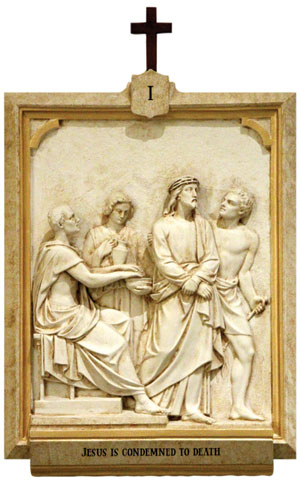
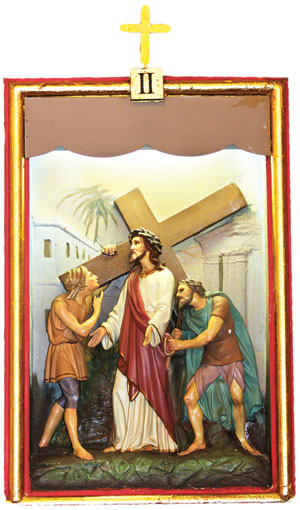
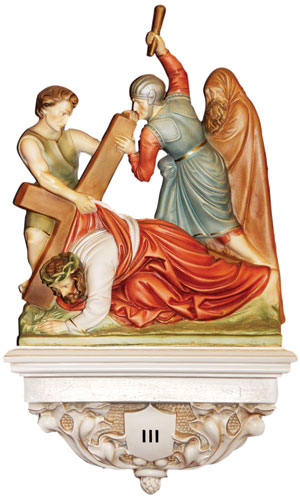
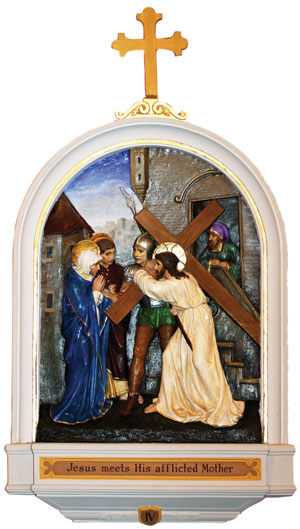



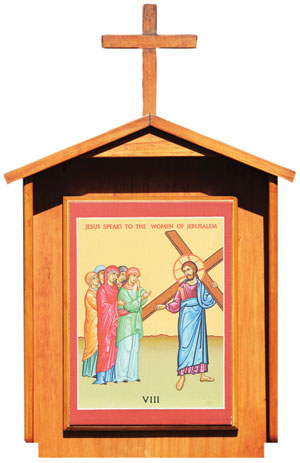
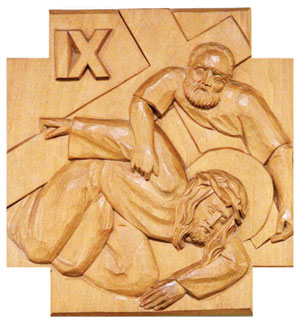
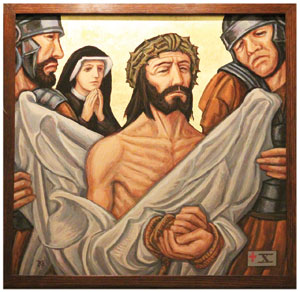
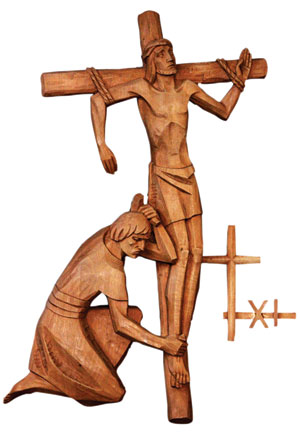
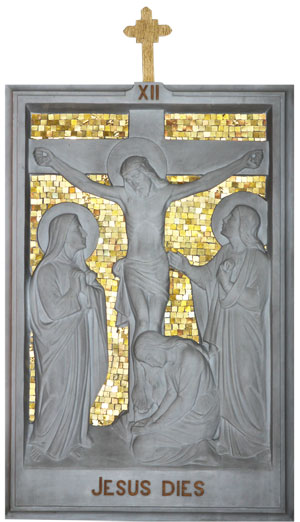
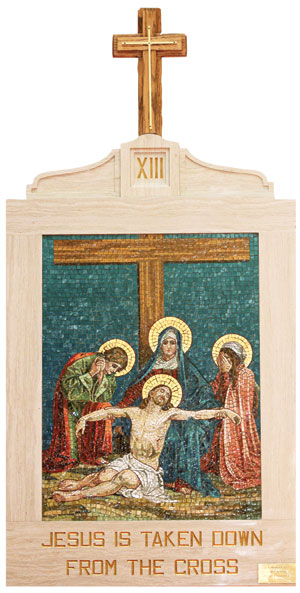
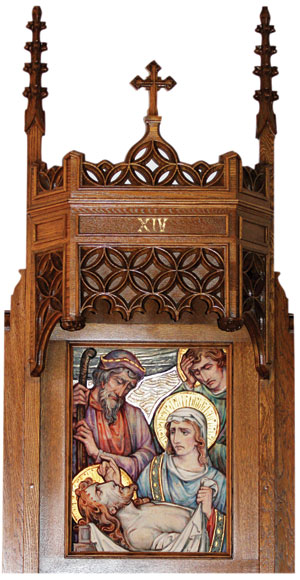
Share this story